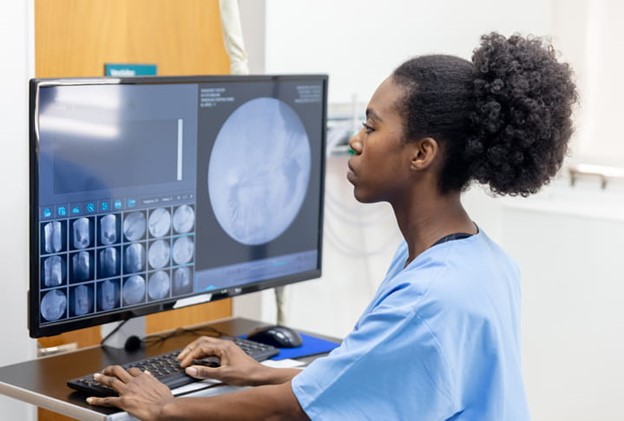CT scans are a common diagnostic imaging tool used to help diagnose different medical conditions and injuries. There are also preventative CT scans used to help identify potential medical problems earlier, like certain types of cancer. When you need a CT scan and have never had one before, it is understandable you have questions about the procedure and want to know what to expect.
What Is a CT Scan?
A CT (computerized tomography) scan involves taking a series of X-rays from different angles of a specific body region. A computer then processes the images to create cross-sectional images of soft tissues, bones, and blood vessels. The resulting images are used to identify injuries, diagnose medical conditions, and plan medical treatments for existing conditions.
What Prompts a CT Scan?
There are many different reasons why your healthcare provider would want you to get a CT scan. Some of the more common reasons include:
- Check for internal injuries and bleeding
- Find the location of blood clots and tumors
- Detect cancer
- Examine nodules and masses
- Detect bone and muscle disorders
- Monitor treatment effectiveness
- Preventative medical scan for cancer screenings for at-risk individuals
- Back, neck, spine, and shoulder injuries
What Are the Most Common Types of CT Scans?
The type of CT scan you need is directly related to the area of the body your doctor wants to examine further. Some of the most common types of CT scans include:
- Angiograms
- Bone scans
- Head CTs
- Cardiac CTs
- Spine scans
- Chest and lung scans
- Abdomen scans
- Pelvic scans
- Neck scans
- Kidney scans
What Things Are Most Commonly Found with a CT Scan?
CT scans can provide details about various body areas and their current condition. Some of the most common things found with a CT scan are:
- Blockages in blood vessels, arteries, and veins
- Masses and tumors in different areas of the body
- Obstructions in the intestines
- Kidney stones
- Injuries to small bones
- Fractures undetected on regular X-rays
- Torn muscles
- Cancer
- Internal bleeding
- Internal inflammation
- Scoliosis
- Herniated disks
- Congenital anomalies
Are There Any Side Effects with CT Scans?
The side effects of CT scans are very rare. There is a very low dose of radiation exposure from the X-rays being taken. Some scans will require the use of a contrast solution. Some people can have minor side effects from the contract solution, such as diarrhea, nausea, dizziness, vomiting, and headaches.
Additionally, some people are allergic to ingredients used in contrast solutions, which can cause a more severe reaction. Therefore, it is crucial to inform your doctor of your allergies.
Related: Cardiac Abnormalities & CT Scans
What Should I Do to Prepare for a CT Scan?
Preparing for a CT scan is easy since there is little preparation. You should wear comfortable clothing. For scans without contrast solution, you need to remove any metal items from your body, including jewelry, glasses, rings, belts, hearing aids, and underwire bras. If you have a pacemaker, it is important to inform the technician before the scan.
For scans with contrast solution, you should stop eating at least four hours before the scan and not drink any liquids at least two hours before the scan. Your doctor may have you drink the contrast solution ahead of time.
What Should I Expect When I Get the CT Scan?
It is recommended to arrive at least 15 minutes before your scheduled appointment. This allows you time to check in and complete any paperwork. When the technician gets you from the waiting room, they will have you remove any metal items from your body. They may also ask you to change into a hospital gown.
The technician will review why you are getting the scan and ask about any allergies. Next, the technician will help position you onto the scan table. If you are getting a scan that requires an IV contrast solution, they will connect an IV line. Before leaving the room, the technician will give you instructions, such as to lay still or breathe slowly.
After they leave the room and start the scan, they can communicate with you over an intercom to give you additional instructions. Depending on the location being scanned, the entire scan can take between 10 and 20 minutes. Once the scan is complete, the technician will come get you.
Related: How to Best Prepare for a CT Scan
How Do I Get the Results of My CT Scan?
After your scan, a radiologist will review it, write a report, and explain any findings. They will then send the results to your doctor. You will need to schedule a follow-up visit with your doctor, who will go over the scan results.
Schedule Your CT Scan in Las Vegas Today
When your doctor has written you a referral to get a CT scan in Las Vegas, and you are searching for preventative medical scans near you, look no further than Preventative Diagnostic Center. We utilize state-of-the-art and the latest technologies in CT scan equipment from Siemens Heathineers. From heart and lung scans to abdomen and full-body scans, we are the perfect place to get your CT scan.
Sources:
Computed Tomography (CT). (2022).
X-Rays. (2022).

